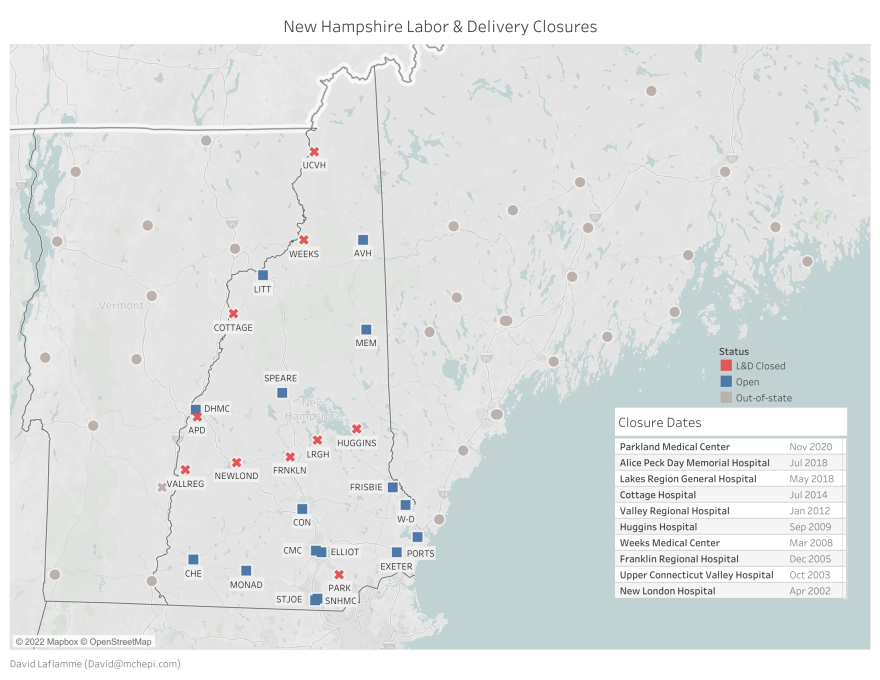Lawmakers and state health officials are boosting funding for birthing services, amid concerns that closures of labor and delivery units have made it harder for many New Hampshire residents to access that care.
Ten hospitals have shuttered their maternity wards over the past two decades, mostly in rural central and northern New Hampshire. Another, Frisbie Memorial Hospital in Rochester,recently announced plans to do so. That move is under review by the New Hampshire Attorney General’s Office.
This year, the Legislature moved to direct more money to hospitals that continue to offer birthing services, by increasing what the state Medicaid program pays them for labor and delivery.
New Hampshire hospital leaders have cited declining birth rates and financial pressures, due in part to low Medicaid reimbursement rates, as reasons for closing labor and delivery units.
Dr. Tim Fisher, an associate professor of obstetrics and gynecology at Dartmouth College’s Geisel School of Medicine, said the rate increase should particularly help rural hospitals in lower-income communities with more Medicaid patients. Those are the types of hospitals that have tended to close their birthing units.
“For many, many years, New Hampshire ranked among the lowest in the U.S. for Medicaid reimbursement to hospitals for labor and delivery services,” said Fisher, who also leads the OB/GYN residency program at Dartmouth Health.
Fisher and two researchers from the Urban Institute explored the impact of birthing unit closures in a study last year. It found that the typical driving time to a labor and delivery unit more than doubled in areas with closures, from 18 to 39 minutes.
Pregnant people who lived farther from birthing units were less likely to attend as many prenatal visits, and more likely to have an unplanned home birth or give birth en route to the hospital, than those who lived closer.
They also tended to be younger, less educated and live in higher-poverty communities, he said — meaning burdens of those closures disproportionately fell on people with fewer resources to begin with.
“If you're about to have a baby and you need to drive to the hospital, do you need to drive 20 minutes?” said David Laflamme, New Hampshire’s former maternal and child health epidemiologist, who has tracked the closures here. “Or if the nearest labor and delivery unit used to be 20 minutes — but now it's 45 minutes, in the winter in New Hampshire — what’s that look like?”
The Medicaid rate increase is targeted at areas most at risk of losing access to that care. Five smaller hospitals in rural areas are seeing increases of 34 percent, compared to 24 percent at larger hospitals, according to Jake Leon, a spokesperson for the New Hampshire Department of Health and Human Services.
Leon said the state health department and the Department of Business and Economic Affairs also plan to commission an analysis of the socioeconomic impact of declines in access to obstetric care in rural communities. That, he said, could inform further legislative action.
Low Medicaid rates aren’t the only challenge to keeping maternity wards open, Fisher said. Rural hospitals face staffing challenges, and declining birth rates can mean falling revenues and less experienced practitioners. But he called the rate increase an important investment in labor and delivery care.
“How much of an impact that will have, I think, remains to be seen,” he said. “But it will help.”
Separately, the state has taken steps to support New Hampshire’s five freestanding birth centers — independent facilities for people with low-risk pregnancies who want an out-of-hospital birth.
A bill passed in May and signed into law in August raised the Medicaid facility fees for birth centers. And last week, the Executive Council approved using $250,000 in federal money to help midwives and birth centers deal with spiraling malpractice insurance costs.
Some birth center owners said those steps will help, but they don’t fully address the financial strains they’re grappling with.
Kate Hartwell owns Concord Birth Center, one of five in the state. She plans to close next summer. Dramatic rises in malpractice premiums — happening across the board, not because of anything specific to her practice — have made the business unsustainable.
She’s grateful the state is providing some short-term assistance: “But it doesn't solve the bigger problem, which is affordable medical malpractice insurance,” she said.
She said that’s been an issue since a state-sponsored malpractice insurance program wound down several years ago, and a hardship fund to help birth centers and midwives temporarily offset the expected cost increases came to an end.
Gentle Landing Birth Center in Hanover is also being squeezed by rising insurance costs, as well as low Medicaid reimbursement rates, according to co-owner and medical director Meghan Sperry.
She said the center’s malpractice insurance spiked about 60 percent this year — an increase of around $40,000. And while she’s noticed a modest increase from New Hampshire Medicaid, its rates remain well below what private insurers and Vermont’s Medicaid program pay, she said.
That’s put the center in the tough spot of considering whether to stop taking New Hampshire Medicaid altogether.
“Do we go out of network with New Hampshire Medicaid because we're losing money, and not serve those clients who really need to have options?” she said. “Or do we stay, and hope that we're getting enough of other clients to make up the difference?”








